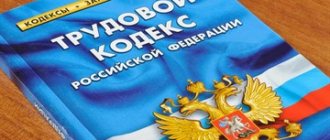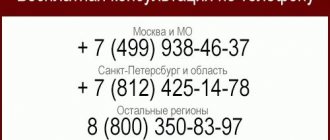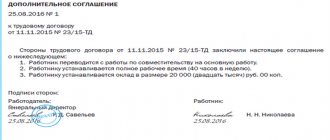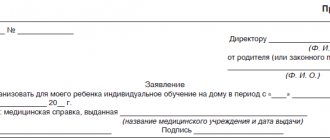Legislation on dismissal of a teacher
Situations in which we are talking about dismissal are recorded in Article 77 of the Labor Code of the Russian Federation. Its provisions apply in particular to those whose profession is to be a teacher. However, working with children is a complex and responsible matter, and in the process of educational activities, complex situations often arise that need to be properly understood.
Sometimes parents are dissatisfied with the way the teacher acts and write complaints against him. It is important to know whether this may cause the termination of an employment contract with a teaching employee. In order to understand this, we must take into account that the Labor Code of the Russian Federation in Article 336 provides additional grounds for the dismissal of teaching staff.
If a complaint has been received against a teacher, then first of all it is necessary to figure out whether there are objective grounds for it. If it is true, then this may cause termination of the employment contract. If the complaint is not confirmed, then this should not affect the teacher’s work.
Articles 192 and 193 of the Labor Code of the Russian Federation indicate what should be understood as disciplinary violations, which may be followed by dismissal.
If a violation is identified, an internal investigation may be conducted to ensure that it is supported by the facts. The basis for such proceedings may be a complaint filed against the teacher. The first step in the investigation is for the supervisor to demand that the teacher provide an explanation for what happened.
It is important to consider that if the procedure for considering a disciplinary sanction is violated, this means that the violation that occurred loses its legal force as a basis for punishment.
Dismissal is possible only if the violation is reasonably qualified as gross. If this is not the case, then milder disciplinary measures, such as a reprimand or reprimand, are applied.
It must be understood that disciplinary measures can only be carried out in cases where a specific and proven violation has occurred, the proceedings for which have been properly formalized.
It is necessary that the punishment be proportionate to the severity of the violation committed. In this case, the specific circumstances of the incident must be taken into account.
If a teacher was required to do something that he was not obliged to do, that was not provided for by the charter, employment contract and other regulatory documents, then this cannot be considered a disciplinary offense.
Article 77 provides the grounds for termination of an employment contract. They may be as follows:
- at the request of the employee;
- based on an agreement concluded by the parties;
- on the initiative shown by the employer.
In the latter case, it is necessary to show the teacher a violation of Article 81 of the Labor Code of the Russian Federation.
Grounds for dismissal according to law
A teacher, like any other employee, can resign on his own initiative. If an open-ended employment contract has been concluded with him, then termination of the employment relationship is possible at his own request. In this case, the teacher must notify the management in writing 14 days in advance.
We invite you to read: The bailiff cannot seize money from the debtor organization
If the teacher was hired under a contract that has a certain validity period, then the employment relationship terminates upon expiration of its validity period. If the contract is terminated early, the consent of both parties is required.
A teacher can also be fired at the initiative of the employer under the following circumstances:
- staff reduction;
- closure of an educational institution;
- inconsistency with the position;
- repeated refusal to fulfill one's duties;
- gross non-compliance with labor discipline;
- violation of labor safety standards, which led to serious consequences.
There are also circumstances that do not depend on the will of the parties in which the employment relationship is terminated. For example, military conscription or natural disasters.
According to the educational laws of the Russian Federation, in addition to inappropriate behavior, according to the charter of the institution, which are presented in Article 192-193 of the Labor Code, a teacher can be dismissed for other reasons.
These include the following conditions:
- Reaching a certain age. A teacher who is 65 years old must be transferred to an easier work position, according to his qualifications. Otherwise, dismissal on personal initiative follows. For older employees, working hours are often reduced to a minimum.
- Conviction under those articles that do not allow you to continue to hold a certain position.
- Having an illness that prevents you from working in a team.
These nuances are discussed in Article 331 of the Labor Code of the Russian Federation. The employment contract is terminated for reasons beyond the control of the parties.
https://youtu.be/MjfSfSdYgM8
Voluntary-forced dismissal
A teacher, if he does not want to continue working at the school, has the right to resign on his own initiative. This procedure is described in detail in labor legislation. However, this formulation may hide other reasons for the teacher leaving his position.
In practice, when working in any team, it is important that all employees comply with unspoken standards. Which have developed in this institution. For the most part, they are not formal in nature, but are considered as important requirements for the work of employees.
If a teacher does not comply with the unwritten rules, sooner or later the director will call him and tell him that they will not work. In this case, the employee is usually given a choice of two options: either he resigns himself, or an unbearable situation will be created for him and, as a result, he will be fired under the article.
Why can a teacher be fired under the law?
The legal conditions for dismissal are prescribed in Article 77 of the Labor Code. They also apply to employees working in public or commercial educational institutions. However, the specifics of such work provide for a number of other aspects that may be a reason for the dismissal of teaching staff.
So, taking into account the norms of the law (Article 336 of the Labor Code), they will be as follows:
- the teacher has reached a certain age;
- rude or violent attitude towards students;
- actions contrary to the organization's charter;
- failure to pass certification.
As for the age factor, a retired teacher cannot be dismissed from his position for this reason. However, transfers to another position are quite common in practice.
Excess of authority regarding violent actions on the part of a teacher is understood as:
- intentionally causing bodily harm to a student;
- violent methods of interaction with children of a psychological nature;
- unfounded criticism and inflated demands;
- other actions of moral pressure that led to a deterioration in the mental health of a minor.
The cases described above cannot be qualified as actions carried out on the part of the teacher through negligence or an accidental coincidence.
Violation or failure to comply with the provisions of the charter implies the teacher’s work activity carried out:
- without observing the norms prescribed in the local acts of the institution in the educational process;
- dishonest performance of one's direct duties;
- cases of inappropriate behavior with teaching staff and students.
The employment agreement with the employee is terminated if he does not pass the certification/does not want to participate in it.
A teacher can leave his place of work at any time, regardless of his class schedule. That is, an employee has the right to resign during vacation or at the beginning, middle, or end of the academic year.
In this case, the manager cannot refuse to dismiss, citing the lack of replacement personnel. The director will have 2 weeks to find a suitable employee to replace the resigning employee, which is allocated to the teacher for mandatory work.
Changing the terms of the contract
When working conditions (organizational or technological) change, management has the right to unilaterally change a number of conditions of a previously concluded employment contract. It is not allowed to make only those changes that change the employee’s labor function. For example, this rule can be used by the manager to ensure that the teacher signs documents that impose additional responsibilities on him.
As an example, we can mention the rules for assessing the performance of teaching staff.
The employee has the right to refuse to work under the new conditions. However, the employer is obliged to offer him another job among those available in the organization. This does not have to be a job in your specialty. Sometimes this may translate into opportunities to work as a dishwasher or janitor.
The employee must be notified in writing that a reorganization is planned two months before it takes place.
If an employee refuses the offered vacancies, he is fired.
The changes made cannot worsen the position of the teacher in comparison with the rules provided for by the collective agreement.
Can a Chernobyl survivor be fired due to unsuitability?
According to Part 3 of Art. 73 of the Labor Code of the Russian Federation, if, in accordance with a medical report, an employee needs a temporary transfer to another job for a period of more than 4 months or a permanent transfer, then if he refuses the transfer or the employer does not have the appropriate job, the employment contract is terminated in accordance with paragraph. 8 hours 1 tbsp. 77 of the Labor Code of the Russian Federation.
Clause 8, Part 1, Art. 77 of the Labor Code of the Russian Federation provides for the possibility of terminating an employment contract if the employee refuses a permanent or temporary (for a period of more than 4 months) transfer to another job, necessary for him in accordance with a medical report, or the employer does not have the appropriate job.
Rough treatment of children
When working with children, the teacher acts not only by conviction or by example, but is also forced to apply punishment to the extent permissible. However, sometimes a teacher’s sense of proportion may fail, and he allows himself to treat students rudely.
The following indicates what may qualify as such actions:
- If a teacher raised his hand to a student and did it intentionally, then this is an unacceptable situation. It is especially bad when the child is injured as a result.
- Violence can be not only physical, but also mental. Systematic harassment and humiliation of schoolchildren, constant threats and insults to the dignity of students are a manifestation of rudeness towards children.
- Sometimes violence can occur in a hidden form. One of these cases is the presentation of clearly excessive and unreasonable demands on the student. Often this involves systematic criticism for which there is no real basis.
There may also be other actions or words that could be considered child abuse.
The teacher's actions considered here can reasonably be considered disciplinary violations.
However, it must be borne in mind that although physical or psychological violence towards children is disgusting, nevertheless, disciplinary measures should not be used in cases where it happened accidentally or due to negligence.
However, final conclusions in this regard can be made after an objective official investigation.
This behavior under certain circumstances may become grounds for dismissal by court decision. However, in this case, to substantiate it, investigative actions must be taken and relevant evidence must be presented.
If the review process was violated in any way, the teacher has the right to challenge the dismissal in district court. If he wins the case, he will be reinstated in his previous position and receive monetary compensation for the time he did not work.
Is it possible to fire a teacher and on what grounds? Reasons for dismissing a teacher
- Intentional infliction of bodily injury or damage. Such actions by the teacher should necessitate seeking help from both a doctor and a psychologist.
- Systematic mental violence in the form of threats, insults, and humiliation of the child’s dignity.
- Systematic presentation of inflated demands on the child and unreasonable criticism.
- Other actions that may lead to disruption of the child’s psychological and mental health.
Often, parents of children write complaints against teachers to higher authorities. To verify the violation described, it is necessary to conduct a thorough internal audit. Is it possible to fire a teacher for parental complaints? But there are other grounds that, under certain circumstances and the fulfillment of a number of conditions, can become grounds for dismissal of a teacher ( Article 336 of the Labor Code of the Russian Federation ):
Immoral offense
There is no precise definition in the legislation of what constitutes an immoral act by a teacher. Therefore, determining whether it has occurred is largely subjective. However, such an accusation may serve as grounds for dismissal.
Dismissal under this article is very difficult to challenge. Even if a commission is organized that will carry out the inspection. Its composition and the rules it must follow when assessing the situation are not regulated anywhere.
Why teachers are actually fired under the article “immoral behavior” is explained in this story:
Dismissal for health reasons and medical reasons
When dismissed for health reasons under the Labor Code of the Russian Federation, the employee must know what compensation he is entitled to. That is why an employee should contact a professional lawyer who will analyze his situation in detail and provide a package of recommendations. Moreover, in the event of a conflict with the manager, legal support will be a serious help in going to court.
When the loss of ability to work is caused by an occupational disease, the demotion does not in any way affect the employee’s salary. He receives the same salary throughout the recovery period. Until the commission recognizes his permanent loss of ability to work (Article 182 of the Labor Code of the Russian Federation).
What to do if you are a teacher and they decide to fire you
In this situation, it is recommended to follow these rules:
- Communication with management must necessarily take place in the presence of witnesses.
- It is advisable to record ongoing conversations using a voice recorder. According to the law, the teacher has the right to do this.
- If threats and promises follow, keep in mind that you can only believe them in cases where they are supported by relevant documents.
- You must be attentive to the documentary support of your activities.
- You should try to get support from other teachers, as well as from the students' parents.
- If a teacher is required to sign documents, then this should not be done thoughtlessly. It is recommended that you consult with a professional lawyer regarding this matter.
In this situation, a trade union organization can help. If the school does not have one, it is possible to initiate its creation yourself.
The procedure for terminating an employment contract with a teaching employee
The procedure for terminating an employment contract with a teacher will partly depend on the grounds, which will be discussed below. In general, dismissal is carried out in accordance with the general procedure provided for in Art. 84.1 Labor Code of the Russian Federation:
- The emergence of general or special grounds for dismissal.
The basis is always documented. If this is leaving work of your own free will - a written statement, if there was one of the special grounds (mental or physical violence was committed against the student) - a complaint against the actions of the teacher and evidence of his guilt, etc.
- Workout.
This stage is carried out only when submitting an application for dismissal of your own free will. Working off is, as a general rule, 2 weeks.
- Union opinion.
If a teacher is a member of a trade union organization, then his dismissal is carried out only with the consent of the specified body, if it concerns:
- about reduction;
- insufficient qualifications;
- repeated failure to fulfill duties (with the condition that the teacher is subject to disciplinary liability).
- Publication of the Order.
The school director, having grounds for dismissal, issues an Order.
Reference. State institutions do not fall under Part 4 of Art. 9 Federal Law No. 402 “On Accounting” and changes related to the adoption of this law, which means they are obliged to use unified forms as primary documents.
For the Order of dismissal, the T-8 form is established (Decree of the State Statistics Committee of January 5, 2004 No. 1). This act must contain the following information:
- date and number of the employment contract;
- date of dismissal;
- Full name and position of the teaching staff;
- grounds for dismissal;
- link to the base document;
- date and signature of the director with transcript;
- signature of the dismissed person on familiarization;
- reference to the opinion of the trade union organization, if required.
- Preparation of personnel documents.
The work book and personal card of the teacher are filled out in the personnel department of the educational organization and are filled out according to the rules established by the Instructions for filling out the specified document (Resolution of the Ministry of Labor of Russia No. 69):
- serial number of the record – gr. 1;
- date of entry – gr. 2;
- grounds for dismissal with reference to the norm of the Labor Code of the Russian Federation, signature of the director and the dismissed teacher - gr. 3;
- link to the Order of dismissal - gr. 4.
The personal card is filled out in form T-2, and information about dismissal is indicated in section 9. The following is written down:
- reason for dismissal and date;
- link to the Order.
The section is signed by the HR department employee and the teacher after the work book is given to the dismissed person (clause 41 of Government Decree No. 225 “On work books”).
- Calculation with the teacher.
The accounting department of the educational organization draws up a note-calculation (form T-61). As payments related to dismissal, wage balances and compensation for unused vacation are calculated. Other payments are established in individual cases (severance pay - in case of liquidation of an institution or reduction of staff).
Reaching a certain age
A teacher who has worked in school for many years sooner or later reaches retirement age. Of course, in most cases he has unique experience and knowledge that can benefit society.
However, as a teacher ages, he or she may wonder whether he or she could be forcibly fired and forced into retirement. In fact, the ground for dismissal cannot be applied to teachers due to the fact that he has reached a certain number of years.
However, upon reaching 65 years of age, the head of an educational institution may be dismissed from his position, but he retains his right to work in another workplace upon transfer. If there are no such options, then he will have to quit.
Can a teacher be fired without his or her wishes?
The governing body of an educational institution can also initiate the resignation of its subordinate from his position. In this case, the following reasons are provided (Article 81 of the Labor Code of the Russian Federation):
- personnel changes in the institution - reduction of staff;
- when an employee does not come to work without good reason;
- refusal to perform their functions;
- closure of an educational institution;
- professional incompetence, which was confirmed by the results of teacher certification;
- without his desire, a teacher can be fired if he comes to work drunk (subject to medical confirmation of such a fact of disciplinary violation);
- theft of material assets (if involvement in a crime is confirmed by the court);
- immoral act;
- violation of labor safety standards.
An employee who will be fired due to violations of labor legislation or internal local regulations, as a rule, does not work for two weeks before dismissal.
In addition to legitimate reasons that may cause a teacher to leave on his own initiative or at the request of management, there are often cases when parents, colleagues and even students simply try to frame the teacher. An employee of an educational institution should know that if he is unlawfully dismissed from his position by the director, he has the right to count on the help of the trade union.
What does an “immoral act” mean, for which a teacher can be fired, is explained in this video:
When a dismissal occurs in violation of established regulations, the dismissed employee has every reason to challenge the decision in court with subsequent reinstatement.
I demand the dismissal of the teacher for violation of pedagogical ethics and professional incompetence.
0 people signed up. Next goal: 100
The action takes place: Moscow, school No. 1811 (building No. 7, former 440), class 3 “F”, teacher - Bykasova Raisa Ivanovna.
At the end of November 2020, a teacher called me to her office for an individual conversation. The teacher's main complaint was that I have absolutely no control over the child's behavior at school. However, in her opinion, I am obliged to do this. Therefore, I purchased a voice recorder with the ability to continuously record 24 hours a day. I began sewing a voice recorder into the child’s clothes (without his knowledge; he didn’t know that he was walking around with a voice recorder) in order to understand how the child behaved at school and how justified the teacher’s claims were. In the process of listening to the recordings, it turned out that the teacher allows himself not only incorrect expressions addressed to the children - “I would be fucking crazy right now,” “what kind of landing is this,” “you blew my mind yesterday,” “look at the tits, right?” “Come in, you crazy people,” “Are you crazy?” and the like, but also raises his voice to a loud scream. I can provide all audio files. In addition, the teacher makes numerous mistakes in the process of teaching lessons. For example, the plural form of chauffeur is chauffeurA; animals are covered with hair, and birds are covered with feathers; the modern calendar is Georgian, Garshin is a contemporary of Napoleon, the tsar was overthrown in Russia in 1918, the real name of Maxim Gorky is Pleshakov, the emphasis in the word quarter is on the first syllable - quarter; economics is needed to save and much more. On February 15, I handed over to Deputy Director M.A. Egorchenkov. audio files and a statement addressed to the director of school 1811 Ryvkin A.A. with a request to evaluate the teacher’s activities based on the provided audio files. After some time, Egorchenkov M.Yu. it was reported that Bykasova R.I. These audio files were transferred for listening and further commenting, a conversation was held with her, and she decided to resign from June 1, 2020. Further, Bykasova R.I. informed her parents that she was being bullied and all the audio recordings were fabricated; on April 13 (Friday, the last day of the holidays) parents began to receive threats against us in a public Whatsapp group. This information was also transferred to Egorchenkov M.A. On April 19, at the initiative of the parents of the class, a parent meeting was scheduled, the topic of which was to discuss the education of children in the 4th grade. However, this meeting turned into a public flogging of me and my child; I was insulted in the presence of Deputy Director M.A. Egorchenkov and head teacher Karpova E.V. right down to obscene language. Further, after Egorchenkov left the class, R.I. Bykasova entered and allowed herself to publicly disseminate false information about me and my child. Bykasova did not react in any way to my attempts to stop her performance. The entire parent meeting was recorded on a voice recorder. Following the results of the parent meeting on April 28, 2018, I again submitted a statement to the school director A.A. Ryvkin. Further, at the suggestion of Bykasova and the parents of the class, bullying of my child by the children in the class was organized. There are audio recordings. The children tried to take the recorder away and insulted my child. The children filmed the child without my knowledge or permission and posted it in a public Whatsapp group (more than 35 people).
On May 10, a teachers' meeting was held to evaluate the work of R.I. Bykasova. based on the provided audio files and the participation of parents, school administration and representatives of the Moscow Department of Education. The work of teacher Bykasova R.I. was found satisfactory, and she was asked to continue working as a class teacher of 3 “F” in the next academic year, which was reported to me in writing on behalf of A.A. Ryvkin (response dated May 16).
On Monday, May 28, 2020, I learned that Bykasova R.I. withdrew her resignation letter and remains working at the school.
Now I am forced to think about transferring the child to another class, and the illiterate and incorrect teacher will continue his work.
Test questions for certified teachers test on the topic
Test tasks for qualification tests of teaching staff of educational institutions.
The following documents were used in preparing the answers:
“Law on Education” of July 10, 1992, as amended on July 6, 2006
“Model regulations on a general education institution” dated March 19, 2001 N 196, as amended on December 30, 2005.
- Who is responsible for the quality of education of graduates?
1) educational institution;
2) teacher;
3) head of an educational institution;
4) head of an educational institution; teachers and parents (legal representatives) of students.
“Law on Education” Article 32. clause 3. An educational institution is responsible, in accordance with the procedure established by the legislation of the Russian Federation, for:
2) implementation of educational programs not in full in accordance with the curriculum and schedule of the educational process; the quality of education of its graduates;
- What, in accordance with the Law of the Russian Federation “On Education,” is the basis for an objective assessment of the level of education of graduates?
1) State certification of graduates, carried out by a state certification and diagnostic service independent of educational authorities;
2) State educational standards;
3) Public and state control of the activities of educational institutions;
4) The basis for an objective assessment of the level of education of graduates is not defined in the law.
“Law on Education” Article 7. 6. State educational standards are the basis for an objective assessment of the level of education and qualifications of graduates, regardless of the form of education.
- Does a teacher have the right to demand that a student attend a museum (at an exhibition, a botanical garden, etc.) if he decides to conduct a visual lesson on his subject there?
1) yes, if this is provided for in the educational program and curriculum;
2) yes, if the administration of the educational institution has authorized such an event;
3) yes, definitely;
4) no, under no circumstances.
- If a teacher, when hired, was given three educational programs (recommended by the Ministry of Education of the Russian Federation; innovative, published in the press; approved by an educational institution), then which of them should he consider a mandatory basis for his activities?
1) The program recommended by the Ministry of Education of the Russian Federation;
2) An innovative program published in print;
3) A program approved by an educational institution;
4) Any of the listed programs, of your choice.
“Standard regulations on a general education institution” 36. The content of general education in a specific general education institution is determined by educational programs developed and implemented by the general education institution independently on the basis of state educational standards and exemplary educational curricula, courses, and disciplines.
- What assessment method is a teacher of a municipal educational institution required to use when monitoring student progress?
1) Any, chosen at your discretion;
2) a method based on taking into account errors, recommended by the Ministry of Education of the Russian Federation;
3) a method based on taking into account the individual successes of students, recommended by the municipal methodological service;
4) A credit method approved by the school’s Teaching Council.
- Is a secondary school teacher right when he believes that the presence of an official inspector (inspector) from the Ministry of Education of the Russian Federation in the classroom is unlawful?
1) Yes, the teacher is right, the presence of an inspector in the lesson is unlawful in all cases;
2) Yes, the teacher is right, but only if the issue being checked is not within the competence of the Ministry or the powers of the inspector;
3) No, the teacher is wrong, but only if the presence of an inspector in the lesson is agreed upon with the leadership of the local education authority;
4) No, the teacher is wrong, the presence of an inspector in the lesson is legal in all cases.
- Which regulatory legal document, in accordance with the Law of the Russian Federation “On Education,” must necessarily contain provisions on the rights and responsibilities of a teacher?
1) Charter of the educational institution;
2) Model regulations on an educational institution of the appropriate type and type;
3) Internal regulations of the educational institution;
4) The rights and obligations of the teacher are determined only by the contract.
“Law on Education” Article 13. clause 1. The charter of an educational institution must indicate:
 rights and obligations of participants in the educational process;
rights and obligations of participants in the educational process;
- Who is responsible for improving the professional qualifications of teachers?
1) The teacher himself;
2) Educational institution;
3) Founder of an educational institution;
4) State educational management body of a constituent entity of the Russian Federation.
“Law on Education” Article 32. clause 2. The competence of the educational institution includes:
4) selection, hiring and placement of personnel, responsibility for their level of qualifications;
- Which of the phrases given in the answer options about discipline in an educational institution belongs to the Law of the Russian Federation “On Education”?
1) “Discipline in an educational institution is maintained on the basis of respect for the human dignity of students, pupils, and teachers”;
2) “Discipline in an educational institution is supported by all participants in the educational process”;
3) “Discipline in an educational institution is maintained by all available methods, with the exception of methods of physical and mental violence”;
4) The law says nothing about discipline in an educational institution.
“Law on Education” Article 15. clause 6. Discipline in an educational institution is maintained on the basis of respect for the human dignity of students, pupils, and teachers
- To whom does the Law “On Education” assign the functions of educating students in secondary schools?
1) Only for teaching staff of an educational institution;
2) Only for the administration of the educational institution;
3) For teaching staff, the administration of the educational institution and for parents (legal representatives) of students;
4) The law does not directly consider the education of students as a special function of a comprehensive school.
“Law on Education” Article 12. clause 1. An educational institution is an institution that carries out the educational process, that is, implementing one or more educational programs and (or) providing the maintenance and upbringing of students and pupils.
“Law on Education” Article 52. clause 5. Parents (legal representatives) of students and pupils are responsible for their upbringing and their receipt of basic general education.
“Law on Education” Article 55. clause 4. When performing their professional duties, teaching staff have the right to freedom of choice and use of teaching and educational methods, teaching aids and materials, textbooks in accordance with the educational program approved by the educational institution, methods for assessing the knowledge of students and pupils.
- What should a teacher do if a student only in his subject has academic debt at the end of the year, and the teacher believes that there is no need to leave this student for a second year? '
1) Independently correct the assessment to a positive one, and recommend to the governing bodies of the educational institution to transfer the student to the next class on a general basis;
2) Try to come to an agreement with the administration of the educational institution and, with its permission, correct the assessment to a positive one;
3) Raise the question of the student’s autumn re-examination;
4) Apply to the governing body of the educational institution for a conditional transfer of this student to the next grade.
“Model regulations on a general education institution” 51. Students who have fully mastered the educational program of the academic year are transferred to the next grade. Students who have academic debt in one subject at the end of the academic year can be conditionally transferred to the next grade. Responsibility for eliminating academic debt by students during the next academic year rests with their parents (legal representatives).
- Is it legal for a teacher to expel a 7th grade student who has reached the age of 13 from a municipal school because he is “lazy and completely unwilling to study his subject”?
1) Yes, such a requirement is quite legitimate and the school administration, without violating the requirements of the law, can satisfy it;
2) Yes, the demand is legal, but only if this student has also repeatedly violated the charter of the educational institution and (or) committed illegal actions;
3) Yes, it is legal if similar demands come from other teachers;
4) No.
“Law on Education” Article 19. clause 7. By decision of the governing body of an educational institution, for repeated gross violations of the charter of an educational institution, a student who has reached the age of fifteen years may be expelled from this educational institution.
- What types of certification of students and graduates are provided for by the Law of the Russian Federation “On Education”?
1) Current certification, quarterly certification, annual certification;
2) Certification based on the results of studying topics, certification based on the results of a quarter, certification based on the results of a half-year, annual certification, final certification;
3) Interim certification, state (final) certification;
4) Current certification, intermediate certification, state (final) certification.
“Law on Education” Article 15.p.3. An educational institution is independent in choosing a grading system, form, procedure and frequency of intermediate certification of students.
“Law on Education” Article 15.p.4. Mastering educational programs of basic general, secondary (complete) general and all types of vocational education ends with mandatory final certification of graduates.
“Law on Education” Article 56, clause 2. The competence of an educational institution includes:
16) carrying out ongoing monitoring of academic performance and intermediate certification of students of an educational institution in accordance with its charter and the requirements of this Law;
- Does a teacher, as a private individual, have the right to provide paid educational services to his own and other students in order to earn additional income?
1) Yes, but only by registering as an individual entrepreneur engaged in individual labor teaching activities;
2) Yes, but only by registering as an individual entrepreneur engaged in individual labor teaching activities and obtaining the appropriate license for educational activities;
3) Yes, but only with the permission of the administration of the educational institution where he constantly works;
4) No.
According to paragraph 2 of the Regulations on licensing of educational activities, approved by Decree of the Government of the Russian Federation of October 18, 2000 N 796, individual labor teaching activities, including in the field of professional training, are not subject to licensing.
Citizens have the right to engage in entrepreneurial activity without forming a legal entity from the moment of state registration as an individual entrepreneur (Clause 1, Article 23 of the Civil Code of the Russian Federation).
Article 2 of the Civil Code of the Russian Federation states: “Entrepreneurial activity is an independent activity carried out at one’s own risk, aimed at systematically obtaining profit from the use of property, the sale of goods, the performance of work or the provision of services by persons registered in this capacity.”
- Is the director of a municipal educational institution right in not allowing a teacher to work who refused the regular medical examination organized and paid for by the founder?
1) Yes, in all cases;
2) Yes, if the obligation to undergo this medical examination is established by the charter of the educational institution;
3) Yes, if more than one year has passed since the previous medical examination;
4) No, since such a medical examination is voluntary.
“Law on Education” Article 53. Clause 3. Teaching staff of educational institutions are required to undergo periodic free medical examinations, which are carried out at the expense of the founder.
- Does the administration of a gymnasium, in the presence of a corresponding vacancy, have the right to justify the refusal to hire a primary school teacher with secondary specialized pedagogical education by the insufficient level of his education?
1) Yes, hiring is carried out at the discretion of the administration itself;
2) Yes, if the Model Regulations on the Gymnasium establishes an educational qualification for work in the primary grades of the gymnasium - higher pedagogical education;
3) Yes, except for cases when a teacher with such education is sent to work by the employment service;
4) No.
- Can the knowledge requirements for a municipal school graduate be reduced if he received education in the family (in the family form of education)?
1) Yes, in all cases;
2) Yes, but only if this form of education was forced to be chosen for objective reasons;
3) Yes, if the appropriate medical rate is presented;
4) No.
- Does the director of a general education institution have the right to refuse to hire a teacher on the basis that he has a criminal record?
1) Yes, at your own discretion;
2) Yes, in accordance with the law, the director is obliged to refuse;
3) Yes, but only to persons who have an unexpunged or outstanding conviction for intentional grave and especially grave crimes provided for by the criminal codes of the Russian Federation and the RSFSR;
4) No.
“Law on Education” Article 53. Clause 2. Persons for whom it is prohibited by a court verdict or for medical reasons, as well as persons who have an unexpunged or outstanding conviction for intentional grave and especially grave crimes provided for The Criminal Code of the Russian Federation and the Criminal Code of the RSFSR.
- In what case does the administration of an educational institution have the right to order a disciplinary investigation against a teaching employee?
1) If an employee violates labor discipline;
2) Upon receipt of a written complaint about a violation by this employee of standards of professional conduct and (or) violation of the charter;
3) If an employee violates labor discipline, standards of professional conduct and (or) the charter;
4) Disciplinary investigations against teaching staff are not provided for by the Law of the Russian Federation “On Education”.
“Law on Education” Article 55. clause 2. A disciplinary investigation into violations by a teaching employee of an educational institution of the norms of professional conduct and (or) the charter of this educational institution can only be carried out upon a complaint received against him, submitted in writing. A copy of the complaint must be given to the teacher in question.
- Does the Law of the Russian Federation “On Education” limit the upper limit of the teaching load of a secondary school teacher?
1) Yes, 36 hours a week;
2) Yes, 18 hours a week;
3) The law provides for a limitation of the teaching load, a specific figure that must be determined in the Model Regulations on the educational institution of the relevant type and type;
4) The Law does not talk about the upper limit of the teaching load.
“Law on Education” Article 55. clause 6. The teaching load of a teaching employee of an educational institution, stipulated in the employment agreement (contract), is limited to the upper limit determined by the standard regulations on the educational institution of the relevant type and type.
- Whose comment (head teacher, representative of the methodological service, representatives of the Ministry of Education of the Russian Federation) regarding the applied teaching methodology should the teacher take into account if, in terms of content, he does not agree with any of these comments?
1) The head teacher, demanding a change in the methodology, since it does not provide the required quality of education;
2) A representative of the methodological service, claiming that the methodology used differs from the traditional ones for the worse;
3) A representative of the Ministry of Education of the Russian Federation, arguing that only methods recommended by the ministry should be implemented;
4) Draws.
- What grounds for dismissing a teacher at the initiative of the administration is illegal?
1) Repeated gross violation of the charter of an educational institution within a year;
2) The use, including one-time use, of educational methods associated with physical and (or) mental violence against the personality of the student or pupil;
3) Appearing at work in a state of alcohol, drug or toxic intoxication;
4) Incorrect behavior and (or) repeated creation of conflict situations in the teaching staff and in relationships with students.
“Law on Education” Article 56. clause 4. In addition to the grounds for termination of an employment contract on the initiative of the administration, provided for by the labor legislation of the Russian Federation, the grounds for the dismissal of a teaching employee of an educational institution on the initiative of the administration of this educational institution before the expiration of the employment contract (contract) are:
1) repeated gross violation of the charter of an educational institution within a year;
2) the use, including one-time use, of educational methods associated with physical and (or) mental violence against the personality of the student or pupil;
3) appearing at work in a state of alcohol, drug or toxic intoxication.
Dismissal on these grounds may be carried out by the administration without the consent of the trade union.
- What grading system should be used when certifying students at the end of the year?
1) Ten points, recommended by the Ministry of Education of the Russian Federation;
2) Two-point (pass-fail), recommended by the education management body of the constituent entity of the Russian Federation;
3) Traditional (four-point), written down in the charter of the educational institution approved by local governments;
4) Any at the discretion of the teacher.
“Law on Education” Article 56. clause 1. The charter of an educational institution must indicate:
e) the assessment system for intermediate certification, the forms and procedure for its implementation;
- Is the teacher right in protesting against a test in his subject in the 6th grade, which is provided for by a frontal test conducted by the local education authority?
1) Yes, I’m absolutely right;
2) I am right if I found out about this only on the eve of its holding;
3) You are right if the complexity of the test does not correspond to the depth of the material studied by students at the moment;
4) No.
- Is a teacher who has worked in a given school for only one academic year, but has 10 years of continuous teaching experience, entitled to a long paid leave of up to one year?
1) Yes, definitely;
2) Yes, if it is established by the founder and (or) the charter of the educational institution that this leave is paid;
3) Yes, if the teacher himself finds a replacement for this period;
4) No.
“Law on Education” Article 55. clause 5. Teaching staff of an educational institution, no less than every 10 years of continuous teaching work, have the right to a long leave of up to one year, the procedure and conditions for the provision of which are determined by the founder and (or) the charter of this educational institution.
- Who is the employer of a secondary school teacher?
1) Educational institution;
2) Founder of an educational institution;
3) Head of the educational institution;
4) Deputy head of an educational institution.
“Law on Education” Article 56. clause 1. For employees of an educational institution, the employer is this educational institution, unless otherwise provided by the legislation of the Russian Federation.
- Does the Law of the Russian Federation “On Education” oblige all teaching staff to switch to a contract form of concluding an employment contract with a specified period of work?
1) Yes;
2) No, in accordance with the law, this issue must be resolved by the administration of the educational institution;
3) No, the law proposes that each region decide this issue independently;
4) No, the Law of the Russian Federation “On Education” does not regulate this issue, but proposes to act in accordance with labor legislation.
“Law on Education” Article 56. clause 3. Labor relations between an employee of an educational institution and an educational institution are regulated by an employment agreement (contract). The terms of an employment agreement (contract) cannot contradict the labor legislation of the Russian Federation.
- Whose opinion on the further study of a 5th grade student who has two unsatisfactory grades at the end of the year should be considered decisive?
1) The class teacher of this student, who believes that he should be retained for the second year;
2) The head teacher, who believes that he should be transferred to a compensatory education class;
3) the Pedagogical Council, which is inclined to transfer him to the next grade conditionally;
4) Parents who expressed a desire to continue his education in the form of family education.
“Law on Education” Article 28. clause 4. Parents (legal representatives) have the right to give their child primary general, basic general, and secondary (complete) general education in the family. A child receiving education in a family has the right at any stage of education, subject to positive certification, by the decision of the parents (legal representatives), to continue education in an educational institution.
- Which municipal school teachers can be involved in the implementation of the additional education program?
1) Teachers teaching mathematics, Russian language and literature, physics, chemistry and other basic subjects, with the exception of music, fine arts, labor;
2) Teachers teaching music, fine arts, labor;
3) The law does not limit this;
4) No one.
“Law on Education” Article 55. clause 2. Additional educational programs include educational programs of various directions, implemented by:
in general educational institutions and educational institutions of vocational education outside the basic educational programs that determine their status;
in educational institutions of additional education (in advanced training institutions, courses, vocational guidance centers, music and art schools, art schools, children's art centers, stations for young technicians, stations for young naturalists and other institutions that have the appropriate licenses);
through individual pedagogical activities.
- If an educational institution sent a teacher as a teacher to a children's labor camp, should this work be paid in excess of the established salary?
1) Yes, in all cases;
2) Yes, if the implementation of such work and duties is not provided for by the employment contract or other regulatory legal acts;
3) Yes, only if these additional functions are performed outside of officially established working hours;
4) No, under no circumstances.
“Law on Education” Article 54. clause 1. Wages and salary to an employee of an educational institution are paid for the performance of functional duties and work stipulated by the employment agreement (contract). The performance of other work and duties by an employee of an educational institution is paid under an additional agreement, except for cases provided for by the legislation of the Russian Federation.
- If a teacher at a municipal secondary school believes that a textbook for his subject, included in the federal list, is not good enough, then does he have the right to use another textbook for teaching?
1) Yes, if it corresponds to the educational program;
2) Yes, but only from those approved by the Ministry of Education of the Russian Federation;
3) Yes, with the consent of the students’ parents;
4) No.
“Law on Education” Article 55. clause 4. When performing their professional duties, teaching staff have the right to freedom of choice and use of teaching and educational methods, teaching aids and materials, textbooks in accordance with the educational program approved by the educational institution, methods for assessing the knowledge of students and pupils.
- Which document (among those listed in the answer options) is not designated in the law as a document regulating the organization of the educational process?
1) Curriculum;
2) Annual calendar training schedule;
3) Class schedule;
4) Internal regulations.
“Law on Education” Article 55. clause 1. The organization of the educational process in an educational institution is regulated by the curriculum (breakdown of the content of the educational program by training courses, by disciplines and by years of study), the annual calendar academic schedule and class schedules, developed and approved by the educational institution independently.
- Is primary education a stage of education or an educational level?
1) Level of education;
2) Both step and level at the same time;
3) Educational level;
4) Neither one nor the other.
“Law on Education” Article 19. clause 1. General education includes three levels corresponding to the levels of educational programs: primary general, basic general, secondary (complete) general education.
- Is it a violation of the law for employees of an educational institution to involve students in campaign work carried out during elections?
1) No;
2) No, if the general meeting of the school made such a decision;
3) Yes, if this is done by force;
4) Yes, in all cases.
“Law on Education” Article 50, paragraph 15. Forcing students and pupils to join public, socio-political organizations (associations), movements and parties, as well as their forced involvement in the activities of these organizations and participation in campaigning campaigns and political actions is not allowed.
- What is the length of the working week defined in the Law of the Russian Federation “On Education” for a secondary school teacher?
1) 40 hours;
2) No more than 36 hours;
3) 18 hours;
4) The Law “On Education” does not define the length of the working week for teaching staff.
“Law on Education” Article 55. clause 5. For teaching staff of educational institutions, reduced working hours are established - no more than 36 hours per week.
- What teaching aids can a general education school teacher use in his work?
1) Any, at your own discretion;
2) Only approved by the Ministry of Education of the Russian Federation;
3) Only approved by the Ministry of Education of the Russian Federation and the education management body of the constituent entity of the Russian Federation;
4) Only schools approved by the Pedagogical Council.
“Law on Education” Article 55. clause 4. When performing their professional duties, teaching staff have the right to freedom of choice and use of teaching and educational methods, teaching aids and materials, textbooks in accordance with the educational program approved by the educational institution, methods for assessing the knowledge of students and pupils.
Law on Education" Article 55. clause 2. The competence of the educational institution includes:
23) selection of textbooks from the approved federal lists of textbooks recommended (approved) for use in the educational process.
- Is a teacher of a general education institution entitled to monthly monetary compensation in order to facilitate his provision of book publishing products and periodicals, and if yes, then in what amount?
1) Yes, in the amount of 100 rubles;
2) Yes, equal to the minimum wage;
3) Yes, in the amount of 150 rubles;
4) No.
“Law on Education” Article 55. clause 8. In order to facilitate their provision of book publishing products and periodicals, teaching staff of federal state educational institutions (including management employees whose activities are related to the educational process) are paid a monthly monetary compensation in the amount of 150 rubles in federal state educational institutions of higher professional education and corresponding additional professional education, in the amount of 100 rubles - in other federal state educational institutions.
- Did the school principal act legally when he fired a teacher for showing up to work while intoxicated?
1) Yes, definitely;
2) Yes, if this is his re-appearance at work in this form;
3) Yes, if the consent of the trade union is obtained;
4) No.
“Law on Education” Article 56. clause 4. In addition to the grounds for termination of an employment contract on the initiative of the administration, provided for by the labor legislation of the Russian Federation, the grounds for the dismissal of a teaching employee of an educational institution on the initiative of the administration of this educational institution before the expiration of the employment contract (contract) are:
3) appearing at work in a state of alcohol, drug or toxic intoxication.
Dismissal on these grounds may be carried out by the administration without the consent of the trade union.
- What decision of the school principal should be considered correct, from the point of view of the Law, regarding a 9th grade graduate who had excellent performance in any subject throughout his studies, but refused to take it at the final exam?
1) Do not certify in any way and issue a certificate of education in the established form instead of a certificate;
2) By all possible and impossible means, force him to appear for the exam, since the final certification after graduating from basic school is mandatory;
3) Certify taking into account the grades of intermediate certifications and failure to appear for the exam; (This answer is considered correct. Why not 1?)
4) Do nothing, placing responsibility on the parents (legal representatives) of the graduate.
“Law on Education” Article 56. clause 3. Basic general education and state (final) certification are mandatory.
“Standard regulations on a general education institution” 52. The mastery of general education programs of basic general and secondary (complete) general education ends with a final certification.
State (final) certification of graduates of general education institutions is carried out in accordance with the regulations on state (final) certification of graduates of general education institutions, approved by the Ministry of Education of the Russian Federation.
“Model regulations on a general education institution” 53. Persons who have not completed basic general, secondary (complete) general education are issued certificates of the established form by the general education institution.
“REGULATIONS on the state (final) certification of graduates of grades IX and XI (XII) of general educational institutions of the Russian Federation” clause 3.8. Minor students of IX grades who are not admitted to the state (final) certification, as well as graduates who have not passed the state (final) certification, at the discretion of their parents (legal representatives), are left for repeated studies or receive a certificate of study in a general educational institution of the established form.
- If a teacher decides to use a new methodology in his activities, which involves practical exercises that require students to perform certain job functions, then how should he ensure the implementation of this methodology?
1) Include practical classes in your work plan and require students to mandatory perform the work functions provided for in this plan;
2) Coordinate this issue with the head teacher and conduct these practical classes as usual;
3) Contact the heads of the educational institution with a request to include these classes in the educational program and curriculum, and after inclusion, begin these classes;
4) Obtain consent to conduct these classes from the parents (legal representatives) of the students and then conduct these classes as usual.
“Law on Education” Article 50, paragraph 14. Involving students, pupils of civil educational institutions without the consent of students, pupils and their parents (legal representatives) in work not provided for by the educational program is prohibited.
RESULT CONTROL TABLE
| A | B | IN | G | A | B | IN | G | A | B | IN | G |
| 1 | 14 | 28 | |||||||||
| 2 | 15 | 29 | |||||||||
| 3 | 16 | 30 | |||||||||
| 4 | 17 | 31 | |||||||||
| 5 | 18 | 32 | |||||||||
| 6 | 19 | 33 | |||||||||
| 7 | 20 | 34 | |||||||||
| 8 | 21 | 35 | |||||||||
| 9 | 22 | 36 | |||||||||
| 10 | 23 | 37 | |||||||||
| 11 | 24 | 38 | |||||||||
| 12 | 25 | 39 | |||||||||
| 13 | 26 | 40 | |||||||||
| 27 |
Reasons for dismissal
A teacher is not just an employee. In addition to the general grounds that give his superiors the right to dismiss him, there are also decrees and decrees of the Ministry of Education, and separate government decrees applicable to teaching staff for unethical treatment of students.
Since recently there have been more cases of outright despotism on the part of teachers, the heads of educational institutions are vigilantly monitoring any violations by employees. It's not just that principals care about the mental and physical health of students, they are also concerned about how to avoid losing their status as a good school.
Conflict between teacher and student
Any conflict between a student and a teacher or him and his parents is most easily resolved not in favor of the teacher. School leaders are trying in every possible way to find at least an approximate solution to the problem that suits both sides. But this is not always possible. If the offense is not very serious, but the parents protect the child too zealously, dismissal will be made on the basis of repeated violation of the charter or a serious disciplinary violation.
For reference! Violation of the school charter is an unlawful attitude towards students, this can include both physical and mental violence.
The director, and then the RONO authorities, based on the evidence presented, determine how much the child suffered from a particular teacher.
Conflict among teaching staff
There are situations in which a teacher cannot interact productively with the staff, and the head of the school decides to fire him.
If in the first case, there really is an official crime that can be proven, then in the second there is nothing illegal. The director would rather ask the employee to leave of his own free will or wait for the slightest violation committed by the teacher.
Other reasons for leaving work
If a teacher finds a common language with students and their parents, and he has long-term friendly relations with the staff, he can be fired on a general basis.
Common grounds for dismissal may include the following:
- staff reduction;
- liquidation of the institution;
- absenteeism.
Violation of safety rules, as a result of which a tragedy occurred, is another reason why you can fire not only a teacher, but also any other employee.
A fairly popular reason for breaking an employment contract is insufficient qualifications. The process of dismissal from a position under such conditions is long, initially the results of the certification commission are necessary, and then, according to the law, a chance must be given to correct the situation or offer the employee a suitable position. In such cases, the employee is sent to additional courses, and then again for certification.










